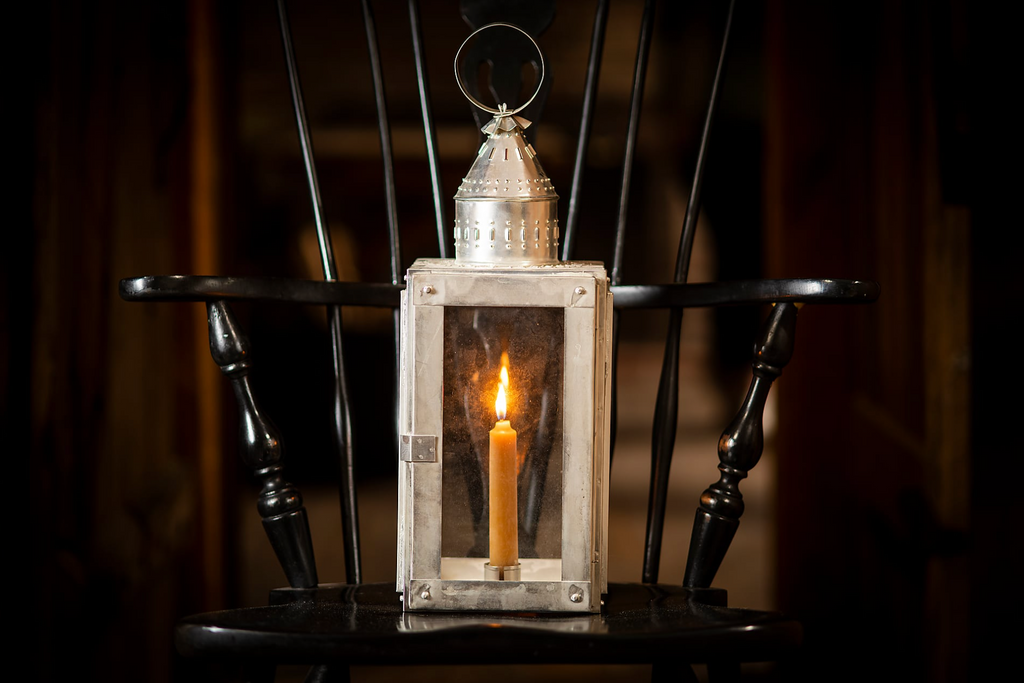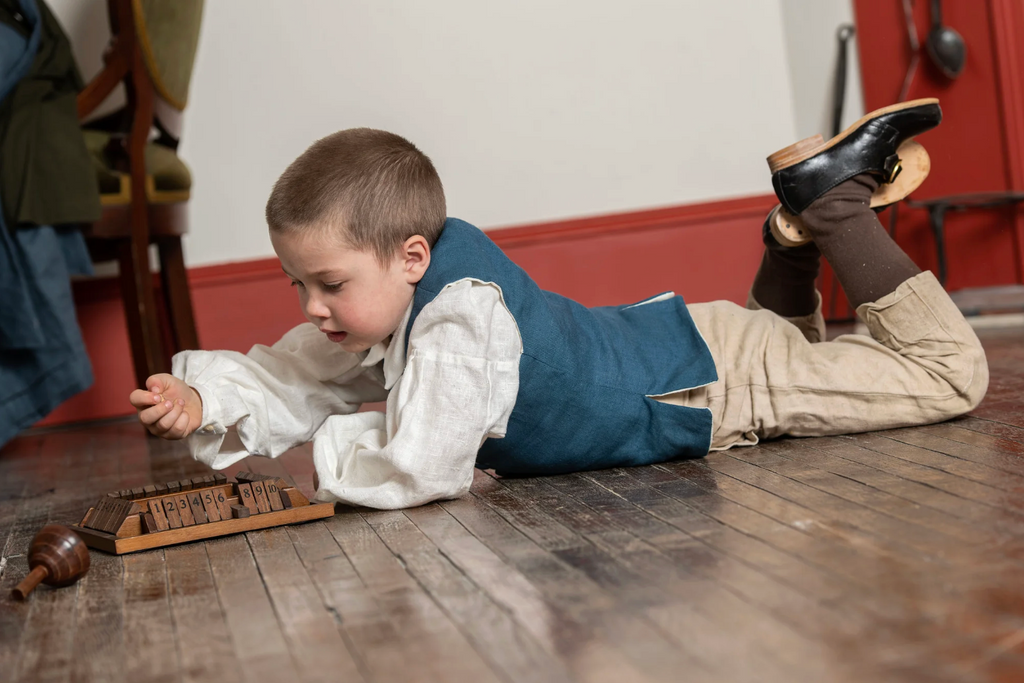You are viewing prices for the United Kingdom 🇬🇧 🏴 🏴 🏴
You are viewing prices for the United Kingdom 🇬🇧 🏴 🏴 🏴
Men’s Clothing
Women’s Clothing
Children's Clothing
The Story of Deborah Sampson, Woman Soldier of the Revolution
by Hannah McIntire 13 min read 4 Comments

By: Heather Michon
“An extraordinary instance of virtue in a female soldier, has occurred lately in the American Army, in the Massachusetts line, viz., lively comely young nymph, 19 years old, dressed in men’s apparel has been discovered,” went the story first published in the New York Gazette. “And what redounds to her honor, she has served in the character of a soldier for nearly three years undiscovered; during which time she displayed herself with activity, alertness, chastity and valour, having been in several skirmishes with the enemy and receiving two wounds,” fragments of which remained in her body.
Published in newspapers from New York City to Boston in January 1784, the story actually got many of the details wrong: the woman had served 17 months, not three years; she was 23, not 19; and few would have described her as “comely” or nymph-like. Instead, Deborah Sampson was a tall, somewhat plain-looking weaver and schoolteacher from Middleborough, Massachusetts, who had disguised herself as “Robert Shurtliff” and served with an infantry company in the final months of the Revolutionary War. Twice wounded in combat, she served undiscovered until a serious illness sent her to a hospital ward in Philadelphia, where her secret was soon revealed. By then, she had so impressed her commanding officers that she was given an honorable discharge in November 1783.
This short newspaper article might have been the first and last anyone heard of Deborah Sampson, but in the early 1790s, she embarked on a decades-long battle to win back pay and pension relief to help support her family. Her campaign eventually led her to petition the Massachusetts Legislature and Congress, commission and publish a biography, and win powerful politicians to her cause. Possibly the first American woman to embark on the lecture circuit, Sampson didn’t always win, but she did secure her place in the American imagination.
“As I was born to be unfortunate, my sun soon clouded”
Deborah Samson -- the ‘p’ entered the historical record much later in her story -- was born in the village of Plympton, Massachusetts, on December 17, 1760, the fifth of Jonathan and Deborah Bradford Samson’s seven children.
She descended from the colony’s first families; her great-great-grandfathers Henry Samson and William Bradford arrived on the Mayflower in 1620. Despite this proud lineage, Deborah’s family lived in poverty. Jonathan Samson had what a local historian later called “a rather transient and unsettled life,” moving from job to job without much financial success. Local lore also held that he and Deborah Sr. were often heard quarreling with each other.
By the time Deborah was 6, her father had vanished from their lives. The story she told her children and grandchildren was that Jonathan had gone to sea to seek his fortune and her mother was later told he died in a shipwreck. In truth, he had simply abandoned the family. He moved to the Maine frontier and took a common-law wife with whom he had two more children. Whether Deborah later learned about his betrayal is an open question, telling her biographer only that “she had little knowledge of her father during her juvenile years.” With no means of support, and despite her best efforts to keep them all together, her mother was “obliged, at length, to disband her family and scatter her children abroad,” placing them with relatives until they were old enough to take on apprenticeships or be indentured as servants.
“As I was born to be unfortunate,” Deborah later told biographer Herman Mann, “my sun soon clouded.” She first lived with an elderly spinster she remembered only as Miss Fuller. When the women died, the 8-year-old Deborah was moved to the town of Middleborough to live with Mary Prince Thatcher, widow of a local minister. When the widow Thatcher died two years later, Deborah was placed in a more permanent situation as a servant to Jeremiah and Susannah Thomas. While it’s not clear if she was formally bound under contract to serve the family until she turned 18, she spent her entire adolescence at their Middleborough home, building skills she would need later in life.

Despite her glum pronouncement, in many ways, Deborah was very fortunate. Rather than growing up in a crowded shack with bickering parents and the moral taint of poverty, she spent her youth in comfortable homes with genteel caretakers who provided not only the basic necessities of shelter, food, and clothing but also taught her to read and write and saw to her spiritual life. However kind, though, these families were not her family and her place in their household was never secure.
As she grew up, Deborah seems to have desired self-sufficiency and self-improvement. She took full advantage of Jeremiah Thomas’s expansive library and his children’s discarded schoolbooks, to the point where he once complained, “You are always hammering upon some book. I wish you wouldn’t spend so much time scrabbling over paper.” She not only helped Susannah Thomas with indoor chores, but she “became acquainted with almost all kinds of manual labor,” a local historian reported in the 1850s. “If occasion required, she could harness the horse and ride him to the plough, or to town on errands. She could rake hay, or stow it away in the barn: was familiar with the milkmaid’s task.” Locals recalled she was a “tolerable mechanic. If she wanted a basket, a milking stool, or a sled she could make them.” She earned pocket money by raising her own chickens and sheep and became skilled enough at whittling to sell handmade pie crimpers and other household goods door to door.
By the start of 1779, she was on her own, having finished her service with the Thomas family. For the next three years, she worked primarily as a weaver. Prosperous families often had the money and space for a loom, but weaving cloth was time-consuming labor and so independent that weavers were given room and board and a small salary in exchange for the work. In the summers, she taught school -- another job that usually came with free room and board. Both weaving and teaching were, at that time, often considered men’s work, but with the Revolution underway, many of the working-age men had gone off to fight.
“Accused of dressing in men’s clothes and enlisting as a Soldier in the Army..”
The story Deborah Sampson Gannett and her supporters told during her long postwar struggle for recognition was simple: she was such an earnest young patriot that she was willing to put everything on the line to disguise her identity and risk death in the cause of liberty. While there is no reason to question her dedication to the American cause, the historical record clearly shows that her path into the military was anything but straightforward and not prompted solely by patriotism.
In reality, her initial motivation was probably financial. At 22, Deborah faced an uncertain future. She was steadily employed but chronically underpaid. She had no marriage prospects, and if a suitor did appear, no money or dowry to bring to a union. There were few opportunities for her to better her situation, until one materialized in the spring of 1782.
As the Revolution began to wind down, Massachusetts towns were having trouble filling their troop quotas. Many turned to bounties to encourage men to sign up for the service, offering a significant cash sign-up bonus for the promise of three years in the ranks. There is compelling evidence that Deborah Sampson decided to collect the bounty but avoid the service.
Deborah never admitted to this first attempt at enlistment, but plenty of people in Middleborough remembered it well. In March 1782, she was boarding with the family of Benjamin Leonard and “borrowed” a suit of clothing belonging to the master’s son, Samuel. Dressed in pilfered clothing, she presented herself to the town recruiter as “Timothy Thayer,” a boy from a neighboring town. “Thayer” signed up, collected the £50 bounty and went to the local tavern for a drink or two. He was never seen again, but Deborah was soon seen spending a suspicious amount of money on gifts and treats, and it didn’t take long for people to figure out the ruse. “There hapend an uncommon affair at this time,” wrote Middleborough resident Abner Weston in his diary the following year. “Deborah Samson of this town dress her self in men’s cloths and hired her self to Israel Wood to go into the three years Servis. But being found out return’d the hire and paid the Damages.”
Between the scandal and the potential for criminal charges, Deborah decided it was a good time to leave Middleborough. Traveling alone as a woman was dangerous, so with her brief stint as Timothy Thayer still in mind, she made a suit of men’s clothing from cloth she had woven herself and then vanished. Later that fall, a sour note appeared in the records of the First Baptist Church that “last spring she (was) accused of dressing in men’s cloths and enlisting as a Soldier in the Army … and for some time before had behaved very loose and unchristian like, and at last left our parts in a sud[d]en manner and it is not known where she has gone ….” If she ever returned to town, she would not be welcomed back into her congregation.
For a month, she wandered from Middleborough to the seaport at New Bedford, then up the coast to Boston, initially planning to go to sea as a cabin boy. Failing to find a good captain or a high enough bounty, she walked west from Boston and finally ended up in the village of Bellingham, where she met a recruiter desperate to fill his quota for the nearby town of Uxbridge. With the promise of a £60 bounty, “Robert Shurtliff” signed up on May 20, 1782, as one of 50 new members of the Light Infantry Company of the Fourth Massachusetts.

“She would rather die than disclose her sex to the army”
“Private Bob Shurtliff” served with the Light Infantry Company for the next 17 months. The most historically significant part of Deborah Sampson’s life is also the least well-documented; between the scanty records kept during the war and the outright fabrications in Herman Mann’s 1802 biography, it is difficult to see much more than the faint outlines of her actual term in service. We do know she spent most of this period in the wilderness around New York City and later around Philadelphia. During the spring and summer, her days would have been filled with scouting, marching, and occasionally skirmishing with the enemy, while fall and winter would have been spent in camp.
Her first stop was the encampment at West Point, New York, where she was issued her gun and uniform of “a blue coat lined with white, with white wings on the shoulders and cords on the arms and pockets; a white waistcoat, breeches or overhauls (overalls) and stockings, with black straps about the knees; half-boots ... and a cap with a variegated cockade on the side, a plume topped with red on the other, and a white sash about the crown.” At 5’7”, she stood shoulder to shoulder with many of her comrades. Flat-chested to begin with, she told Mann she wrapped her breasts to hide them further but otherwise left to the imagination the details of how she disguised her gender.
The real challenge to her secret came during that first summer when she was twice wounded in a small skirmish with the enemy. As with so much of Deborah’s military service, it’s unclear what actually happened. In various retellings, she was wounded in the thigh, the breast, the groin, or the shoulder. In some versions, she dug the bullet fragments out with the knife from her mess kit by the light of a campfire; in other versions, she was taken to a French army field hospital and snuck off to tend her own wounds with a penknife after she was revived by a sip of wine. In Mann’s melodramatic retelling, when she first realized her predicament, she contemplated drastic measures. “She always thought she would rather die, then disclose her sex to the army,” he wrote, telling readers she had pulled her pistol and was about to commit suicide, but “banished the shocking act and idea” from her mind and began tending to her wounds. She recovered quickly and returned to the ranks.

Over the winter of 1782-1783, Private Shurtliff was reassigned to serve as an orderly for General John Paterson. She flourished in the job, drawing on the skills she had learned as a servant and laborer for the Thomas family to keep Paterson and his staff comfortable and well-fed. As the general’s waiter, she gained status, better food, and more comfortable lodgings. It also kept her out of the crowded barracks, making it easier to keep her secret -- at least for a few more months.
In June 1783, Paterson and his men were ordered to Philadelphia to help put down a mutiny brewing among American soldiers in a fight over missing pay and the pace of demobilization. Within weeks, Deborah fell ill with one of the diseases raging across the region. She became too sick to prevent her removal to a hospital, where Dr. Barnabas Binney quickly discovered “Bob Shurtliff” wasn’t who he seemed to be. Binney apparently took pity on Deborah and moved her to his own home so he and his wife could nurse her back to health while preserving her privacy. When she recovered in the fall, Binney sent her to rejoin Paterson. He gave her a note to give to the general, which she correctly assumed would reveal her gender.
At West Point, she gave Paterson the note and retreated, waiting for the inevitable. When she was called back to his office, “a re-entrance was harder than facing a cannonade,” she recalled. To her surprise, Paterson was more shocked than angered. He and his staff were amazed that she had been able to disguise herself for so long and perform so well as a soldier. Rather than punish her or charge her with a crime for her deception, Paterson decided to simply hand her an honorable discharge and allow her to remain as Private Shurtliff until her unit disbanded in November 1783. She would forever after refer to him as “my friend.”
“They are really poor”
In March 1802, the audience at Boston’s Federal Street Theater was treated to an unusual performance. Deborah Sampson Gannett, now a 42-year old farm wife and mother of four, stepped on to stage to deliver a lecture entitled “The Soldier’s Festival On the Eve of Battle, in which Mrs. Gannett will deliver her Narrative.” After telling a lightly fictionalized version of her time as Private Shurtliff, a chorus came out to sing patriotic songs as Deborah slipped backstage. When she returned a few moments later, she was dressed head to toe in her old army uniform and carrying an old flintlock musket. With another veteran calling out the commands -- “Poise - Firelock!” “Cock - Firelock!” -- she flawlessly moved through the 27 steps of the old manual exercise drill she had first learned two decades earlier. The audience reacted with what her biographer called “universal acclimations of joy” at her performance.
It was a moment she would not have imagined as she made her way home to Massachusetts in the winter of 1783. Her immediate needs were basic: a job, a place to live, maybe even companionship. She ended up in Sharon, a farming community about 25 miles south of Boston. By October 1784, she was betrothed to a young widower named Benjamin Gannett.
By the time they married in April 1785, she was already pregnant with their first child. Earl was born in November of that year, followed by Polly in December 1787 and Patience in November 1790. In 1796, they adopted Susanna, a baby left orphaned when her mother died in childbirth. To help with this small but active brood, Deborah had the assistance of a servant named Patience Payson, who joined the household and stayed until her death almost 50 years later.
The Gannett family lived in a small, one-story house centered around a large kitchen and common area. They worked a small plot of land that provided subsistence but little more. Deborah occasionally supplemented the family income by teaching at a one-room schoolhouse down the road, but it was hardly enough.
Like many common soldiers during the Revolution, she had not received her monthly pay for much of her time in the ranks. As early as 1786, she began collecting documentation supporting her claim for back pay, and in January 1792 filed a suit in the Massachusetts General Court for restitution.
“The memorial of Deborah Gannet (sic]) humbly showeth that your memorialist from Zeal for the good of her Country,” had served as Robert Shurtliff for a period of over a year, but “being a Female, and not knowing the proper steps to take to get pay for services, has not receiv’d one farthing for her services,” the document read in part. The Massachusetts Legislature, lavishing her with praise as a “faithful, gallant soldier,” quickly voted to pay £34, or £2 for every month of her service.
Deborah didn’t stop there. By the late 1790s, she had decided to petition Congress for a military pension based on disability. It was a daunting task: she would have to collect affidavits from officers and surgeons from the 1780s and testimony from community leaders attesting to her continuing disability. To support her case, she worked with Herman Mann on the publication of her biography and traveled to New York to solicit political figures to plead her case to the Congress. Nevertheless, her request was denied.
Although reluctant to leave her children, she decided to take her story on the road -- quite likely the first woman in U.S. history to join the lecture circuit. From June 1802 to April 1803, she traveled more than 1,100 miles and stopped in every major town in Massachusetts and the Hudson River Valley. She made it as far as New York City, where a combination of exhaustion, illness, and terrible reviews ended her tour. Gannett enjoyed the adulation and warm welcomes she received, and even spent a month staying with her old friend General Paterson at his rural New York retreat, but the high cost of travel ate up most of her profits. She returned to Sharon sick and depleted, with only $110 to show for her efforts.
During her long fight with Congress, Deborah gained powerful allies, including Paterson, Massachusetts Congressman William Eustis, and even Paul Revere himself.

“When I heard her spoken off (sic) as a Solider, I forme the Idea of a tall, Masculine female, who had a small share of understanding, without education, & one of the meanest of her Sex,” he wrote a friend after meeting her in 1804. “When I saw and discoursed with (her) I was agreeably surprised to find a small, effeminate, and conversable Woman, whose education entitled her to a better situation in life.” But, he added, “she is much out of health,” and despite her efforts, “they are really poor.” He often lent the Gannetts money to get by.
She continued to push her case with Congress. In March 1805, she was added to the rolls of invalid pensioners and awarded $104 in back payments and $48 a year going forward. In 1809, she petitioned again for back payment going back to 1783. This would have been a windfall of almost $1,000 for the family, but Congress balked. By 1818, Congress had passed a general pension act for Revolutionary War soldiers that came to $96 per month, so she relinquished her disability payments and took the general pension. In documents supporting her case for pension, she listed her statement of property as simply “Wearing apparel -- $20.”
Deborah died on April 29, 1827, at 68. Few newspapers noted her passing, and there is no record of a funeral or memorial service. The Gannetts were too poor to pay for a headstone, so her gravesite in Sharon’s Rock Ridge Cemetery was unmarked for more than 20 years. Even then, she was given only as “Deborah, Wife of Benjamin Gannett.” Like so many Revolutionary soldiers, she was all but forgotten for decades, when historians began to re-examine the era. Her legend continued to grow, and by 1983 she became the first “Heroine of Massachusetts” in a proclamation by then-Governor Michael Dukakis. Commemorating the date of her enlistment, the state observes Deborah Sampson Day each May 29. Her gravestone was later amended to read:
Deborah Sampson Gannett
Robert Shurtliff
The Female Soldier
4 Responses
Bob
February 06, 2026
W article Deborah Sampson’s the goat
werty boi
May 20, 2024
wow
werty boi
May 20, 2024
wow
Leave a comment
Subscribe
Sign up to get the latest on sales, new releases and more …






Bob
February 06, 2026
Deborah Sampson is elite ball knowledge